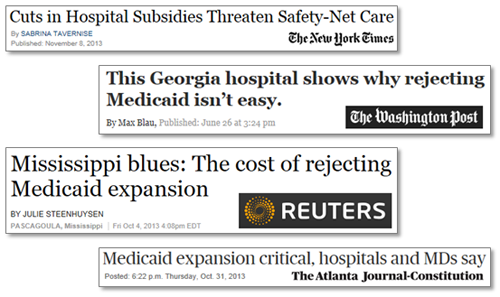Republicans Put Red State Hospitals at Risk

Among the myriad tactics Republicans are using to sabotage the Affordable Care Act, the "coverage gap" is perhaps the most visible. Because 26 GOP-led states have refused to accept the federally-funded expansion of Medicaid to their residents earning up to 138% of the poverty level, at least five million Americans will needlessly be left without health insurance in 2014. As it turns out, that Republican rejection will deal a second body blow to the red state health care systems that need help most by draining funds from hospitals that currently serve the uninsured.
As the New York Times reported, Memorial Hospital in Savannah, Georgia "is now facing the loss of nearly half of its roughly $100 million in annual subsidies known as disproportionate share hospital payments." The Times explained how the Republican temper tantrum after the Supreme Court made Medicaid expansion optional for the states is putting red state hospitals at risk:
Now, in a perverse twist, many of the poor people who rely on safety-net hospitals like Memorial will be doubly unlucky. A government subsidy, little known outside health policy circles but critical to the hospitals' survival, is being sharply reduced under the new health law.
The subsidy, which for years has helped defray the cost of uncompensated and undercompensated care, was cut substantially on the assumption that the hospitals would replace much of the lost income with payments for patients newly covered by Medicaid or private insurance. But now the hospitals in states like Georgia will get neither the new Medicaid patients nor most of the old subsidies, which many say are crucial to the mission of care for the poor.
Savannah Memorial has plenty of company in Georgia. Republican Governor Nathan Deal said no to $33 billion in new federal Medicaid funding over the next decade. But as the federal government significantly reduces funding on Disproportionate Share Hospital (DSH) payments for the care of the uninsured, states like Georgia which turned down Obamacare's Medicaid dollars will be on the hook to make up the difference. For Grady Memorial Hospital, the largest in the metro Atlanta area, what could have been an annual boon of $60 million and coverage for 27,000 uninsured patients instead will be a $45 million loss. Georgia taxpayers will have to pay more even as hospitals likely cut services. Meanwhile, three cash-strapped rural hospitals have already closed their doors. Another 15 may follow suit in 2014. All because a Republican Governor said "no" to free money from Washington, DC.
And the funding is virtually free to the states. The federal government will pay for 100 percent of the cost of the Medicaid expansion until 2017 and 90 percent after that. But the billions the "opt-out" states will have to come up with in future years will be more than offset by their extra costs to compensate hospitals and other providers for the care of the uninsured. As Ezra Klein and Evan Soltas summed up an analysis by the RAND Corporation of 14 Medicaid rejecting states:
It finds that the result will be they get $8.4 billion less in federal funding, have to spend an extra $1 billion in uncompensated care, and end up with about 3.6 million fewer insured residents.
So then, the math works out like this: States rejecting the expansion will spend much more, get much, much less, and leave millions of their residents uninsured. That's a lot of self-inflicted pain to make a political point.
Which is just one of the reasons why an increasing number of red state governors are accepting the dollars from DC. GOP governors in Michigan, Pennsylvania and Ohio ran the numbers. In Ohio, Governor John Kasich's decision to take Washington's money will actually produce a $400 million surplus for the Buckeye State (one which Republican legislators want to give away in the form of more tax cuts). The simple math-and simpler consideration in insuring millions of indigent patients as the DSH funding is reduced over time is precisely why hospital associations in Texas, Kentucky, Georgia, Mississippi, North Carolina and every other state pleaded with Republican governors and legislatures to take Obamacare's money for Medicaid expansion. Just last week, the Fitch ratings agency released a special report titled, "Adverse Expansion: Hospitals, States and Medicaid," which warned that:
"Hospitals operating in states not expanding Medicaid, which usually have higher uninsured and poverty rates, will have to absorb the full impact of the ACA reimbursement cuts without the full benefit of increased insured volumes," said Adam Kates, Director in Fitch's Public Finance group. Texas, Florida, Georgia, Louisiana, Mississippi, and South Carolina are not expanding Medicaid and have among the highest uninsured and poverty rates, and some of the most stringent Medicaid eligibility requirements. Fitch believes hospitals in these states, particularly those with weak payer mixes, will be particularly vulnerable.
It's no wonder Arizona Governor Jan Brewer, certainly no friend of Barack Obama, explained her decision to extend Medicaid coverage to 300,000 more people in her state this way:
"It's pro-life, it's saving lives, it is creating jobs, it is saving hospitals."
Meanwhile in Georgia, Matthew Hicks, vice president for government relations at Grady lamented:
"The conversation we are having with the congressional delegation goes like this, 'If we don't expand Medicaid, what is the Georgia solution to indigent care?' So far they don't have an answer."
Sadly, the Republican answer to the low-income uninsured and the hospitals which care for them is pretty clear. Better dead and in the red than in bed with Obamacare.

